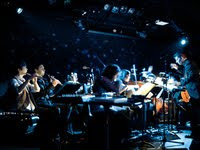 International Contemporary Ensemble (ICE): ICElab
International Contemporary Ensemble (ICE): ICElabSaturday, June 4, 2011 @ Museum of Contemporary Art, Chicago, IL
Ryan Nelson: conductor
Claire Chase: flute
Eric Lamb: flute
Campbell MacDonald: clarinet
Joshua Rubin: clarinet
Rebekah Heller: bassoon
David Byrd-Marrow: horn
Gareth Flowers: trumpet
Dan Peck: tuba
Daniel Lippel: guitar
Erik Carlson: violin
Jennifer Curtis: violin, mandolin
Katinka Kleijn: cello
Jacob Greenberg: piano
Nathan Davis: percussion
Tony Arnold: narrator, soprano
Ryan Ingebritsen: sound engineer
Nathan Davis: Bells (2011) for 2 flutes, clarinet, percussion, and live electronics activated by cellular phones
Du Yun: The Last Post, music for the film by Shahzia Sikander (2011) for flute, clarinet, bassoon, tuba, percussion, guitar and voice
Nathan Davis: On the Nature of Thingness (2011) for flute, clarinet, bassoon, horn, trumpet, piano, vioin, cello, soprano, conductor, guitar and engineer
Marcos Balter: AEsopica (2011) for flute, clarinet, bassoon, horn, tuba, piano, two violins, cello, soprano, guitar and conductor
At the sound of a bell the audience milling about in the lobby of the Museum of Contemporary Art pulled out their cell phones and dialed into a conference call. Each entering a code for one of four electronic tracks from the Nathan Davis piece being performed within their midst. With speakers turned on and turned out, the soft presence of tiny speakers added a delay to the electronic sounds within the reverberant space. Performers armed with flutes and percussion instruments moved within the crowd. Occasionally adding to the sonic texture. A clarinetist could be heard from one balcony. A percussionist on another along with live electronic manipulations.
The audience participation of collective cellular phones brings to mind the new music holiday tradition of Phil Kline's Unsilent Night with its boom boxes strolling down the street. Much of the spatial energy was similar. Even if the communal element was conspicuously absent. What the din of tiny speakers did bring out is the sense of impoverishment common to many pieces where live electronics and acoustic instruments. The full spectral beauty and richness of real gongs, bells and flutes contrasted sharply against the lo-fi sounds from the phones.
Nathan Davis' other piece of the evening, On the Nature of Thingness used amplification to similar effect. Dulling the qualities of live acoustic sound by stretching the timbre into a caricature of itself. This was accompanied by a text that effectively did the same thing to language.
Du Yun's The Last Post was a study in beautiful textures worn thin. Accompanied by an astonishingly beautiful video by Shahzia Sikander. The extreme distance between performers at opposite ends of the stage added a strange sense of detachment between media and sound.
Marcos Balter's AEsopica began with some amazing orchestration that quickly dissolved into an overly theatrical mashing together of disjointed extended techniques. Each promising moment cut short along the way.
ICE executive director Claire Chase repeatedly referred to the ICElab project as a vehicle for the music of this generation. There is no doubt that this generation will produce amazing music. But there were no keepers in this evening's program. Like every emerging generation, there are a number of aesthetic dead ends to be worked out. And several were on display here. The talent and precision of this well rehearsed ensemble was clearly not at fault.
One thing that made this performance far more difficult than it needed to be were the brief conversations between Claire Chase and the composer before each piece. Such dialog means little before a piece is heard and is often unwelcome after it has been played. Composers are rarely articulate in a concert setting and Chase often sounded like one of the "NPR Ladies" from Saturday Night Live speaking as quickly as possible. Musical works need to speak for themselves and they rarely live up to the verbal baggage thrown at them when presented in this manner.
The desire to give a pre-performance presentation is unique to formal concert spaces. An attitude has evolved in concert halls and orchestral venues that believes the audience needs to be spoon fed its information about the music. Chances are that the audience is there because they're already informed or at least interested and there is no shortage of information readily available in this wired world. Spoon feeding is not needed and is often defeating. Many of these conversations should have been done as a podcast for those inclined to hear them.
Also, formal concert spaces need to learn from the experience found in less formal spaces. The Umbrella Music concerts are an excellent example. With at least three concerts every week in bars and art galleries this series succeeds by consistently presenting great music that never feels precious. The music is respected by a "keep the talking to none" policy that respects both performers and listeners. I have to think that New Music could grow and give voice to this generation much more quickly if allowed to flourish in less formal venues with this kind of frequency. The access to quality beers doesn't hurt the experience either.


2 comments:
Good points and talk-back sessions presumes the audience is too ill informed to appreciate the music without instructions. An insult to the audience.
Devin, you really nailed something I've been thinking about for a while. Very well said. I know from speaking with the uninitiated that they do sometimes appreciate this spoon-feeding, but it seems to be mostly done for the purpose of looking good on grant applications, like, "we're really taking it to the people! We're having dialog!" I'd rather they put the energy into finding better compositions to play.
Post a Comment